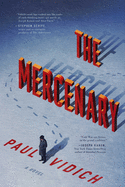
The fourth world-weary Cold War spy novel from Paul Vidich, set in the unstable Soviet Union of the mid-1980s, isn't the macho, techno-thriller adventure one might expect of a book called The Mercenary. Instead, it's a tense and pained study of the loneliness of spycraft, the toll of maintaining dual identities and the terror of living a life where everyone around you might secretly be playing the same game. Vidich's Cold War echoes that of Alan Furst or even John le Carré, a shifting labyrinth of dangers both violent and existential.
Vidich's mercenary is a Russian-born and KGB-trained American dispatched by the CIA to Moscow to exfiltrate a Soviet military officer. Readers expecting the usual drop points, double crosses and veiled chatter with enemies at embassy soirees will be satisfied. The story sprawls out to include an uncertain romance, transfers of power in the Kremlin, secret court proceedings, rumors of moles on both sides and--inevitably--a border crossing that's almost unbearably suspenseful.
But Vidich's tight plotting and focused, polished prose keeps The Mercenary, like its predecessors The Coldest Warrior and The Good Assassin, concise and quick moving, despite the complexity of the story. His attentiveness to the disorienting misery of undercover work, the divided loyalties and threats to identity, power the narrative rather than slow it down. His hero's every interaction is fraught with danger that movie-style violent heroics would only make worse. Vidich dramatizes that dread and that humanity with elegance. --Alan Scherstuhl, freelance writer and editor

